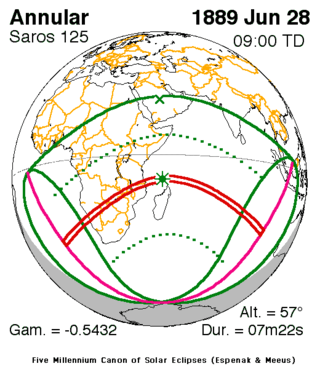Solar eclipse of June 28, 1889
| Solar eclipse of June 28, 1889 | |
|---|---|
 Map | |
| Type of eclipse | |
| Nature | Annular |
| Gamma | -0.5431 |
| Magnitude | 0.9471 |
| Maximum eclipse | |
| Duration | 442 sec (7 m 22 s) |
| Coordinates | 9°36′S 47°18′E / 9.6°S 47.3°E |
| Max. width of band | 232 km (144 mi) |
| Times (UTC) | |
| Greatest eclipse | 9:00:00 |
| References | |
| Saros | 125 (47 of 73) |
| Catalog # (SE5000) | 9256 |
An annular solar eclipse occurred on June 28, 1889. A solar eclipse occurs when the Moon passes between Earth and the Sun, thereby totally or partly obscuring the image of the Sun for a viewer on Earth. An annular solar eclipse occurs when the Moon's apparent diameter is smaller than the Sun's, blocking most of the Sun's light and causing the Sun to look like an annulus (ring). An annular eclipse appears as a partial eclipse over a region of the Earth thousands of kilometres wide.
Related eclipses
It is a part of solar Saros 130.
Notes
References
| Wikimedia Commons has media related to Solar eclipse of 1889 June 28. |
This article is issued from Wikipedia - version of the 4/27/2015. The text is available under the Creative Commons Attribution/Share Alike but additional terms may apply for the media files.
